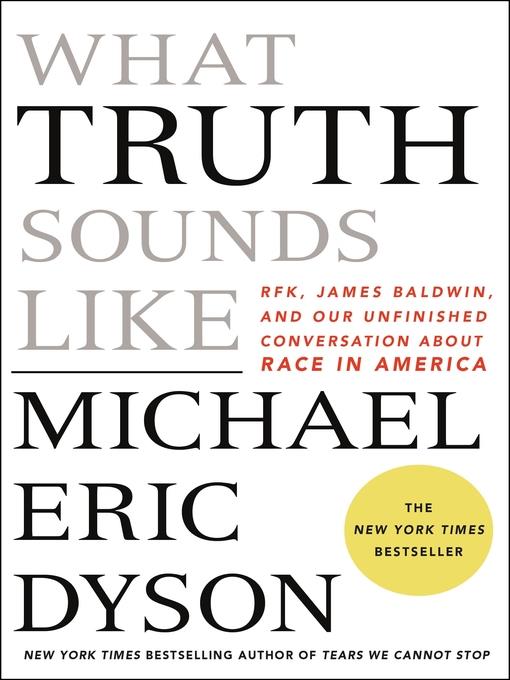
What Truth Sounds Like
Robert F. Kennedy, James Baldwin, and Our Unfinished Conversation About Race in America
کتاب های مرتبط
- اطلاعات
- نقد و بررسی
- دیدگاه کاربران
نقد و بررسی

May 15, 2018
A social and political analyst reflects on racial tensions in contemporary America.In 1963, Robert Kennedy asked James Baldwin to organize a small, private gathering of prominent African-Americans in order to hear their views on combating segregation and discrimination. Dyson (Sociology/Georgetown Univ.; Tears We Cannot Stop: A Sermon to White America, 2017, etc.) uses that meeting as a jumping-off point for an incisive look at the roles of politicians, artists, intellectuals, and activists in confronting racial injustice and effecting change. The meeting, notes the author, was frustrating for Kennedy and his guests. Besides Baldwin, they included playwright Lorraine Hansberry, black activist Jerome Smith, and entertainers Harry Belafonte and Lena Horne. Hoping that a conversation would result in a practical "urban agenda," Kennedy was stunned by "a gut punch of black rage." For nearly three hours he listened to "violent, emotional verbal assaults," especially from Smith, who claimed that he was "close to the moment where I'm ready to take up a gun." To Kennedy, his guests seemed "more interested in witness than policy." Their emotional testimony struck him as "hysterical." For their part, they saw Kennedy as a well-meaning but ignorant white liberal. White America's hatred of blackness, Kennedy's guests agreed, "could never be solved solely by a governmental program." The meeting, Dyson asserts, exposed rage that still persists, as blacks struggle to find "room to breathe within the smothering confines of white society" and public figures grapple for solutions. The author points to Minneapolis Councilwoman Andrea Jenkins and California senator Kamala Harris; black intellectuals Ta-Nehisi Coates, Erin Aubry Kaplan, and Farah Jasmine Griffin; artists Jay-Z and Beyoncé; and sports figures Muhammad Ali and Colin Kaepernick as inspiring figures courageous enough "to face down oppression in our land." Dyson also celebrates the potent image of Wakanda in the movie Black Panther, which helps "remythologize blackness, to see blackness as an imagined kingdom of possibility, to see it as an alternative universe of humane endeavor."An eloquent response to an urgent--and still-unresolved--dilemma.
COPYRIGHT(2018) Kirkus Reviews, ALL RIGHTS RESERVED.

May 28, 2018
Sociologist and political commentator Dyson (Tears We Cannot Stop) delivers a piercing and wide-ranging analysis of American race relations. The focal point of the book is a 1963 meeting between Sen. Robert Kennedy and a group of notable African-Americans, organized by Kennedy to “sound out the prospects for racial change” during a period of extreme social tension. The group included several prominent and celebrated figures—writer James Baldwin, musician Harry Belafonte, singer Lena Horne, and playwright Lorraine Hansberry—as well as Jerome Smith, a Freedom Rider recovering from vicious beatings. The meeting quickly devolved into a tense and explosive encounter. The group “let the rage run free,” forcing Kennedy to finally listen to the anguish of black America. Dyson depicts this as “a watershed moment in American politics” that began a conversation, which continues to this day, about the need to force white people to be witnesses to black suffering, the limits of mainstream liberalism and its gradualist approach, and “the explosive power of truth through testimony.” Dyson rounds out the book by bringing contemporary cultural touchstones into the discussion, among them Jay-Z, Beyoncé, the film Get Out, Bernie Sanders, Hillary Clinton, Ta-Nehisi Coates, and Black Lives Matter. This is a poignant take on still-festering racial tensions in the United States.

June 15, 2018
In his latest book, Dyson (Tears We Cannot Stop) uses the historic 1963 meeting between then attorney general Robert F. Kennedy and a group of black cultural leaders organized by James Baldwin to frame the current state of the black artist in America. Dyson jumps between the two moments of cultural change to look at how the fractured racial landscape of America has morphed over the last 50 years. While he never ignores the echoes of pre-civil rights movement racism, Dyson's goal is to highlight the artists and activists who continue to bear witness to the messages that Baldwin, Lena Horne, Harry Belafonte, Jerome Smith, and Lorraine Hansberry delivered that day in May. His list of contemporaries includes Jay-Z, Keegan-Michael Key, Jordan Peele, Kamala Harris, Ta-Nehisi Coates, Cornel West, Erin Aubry Kaplan, Patrisse Cullors, Opal Tometi, Alicia Garza, and Colin Kaepernick, among others. The book concludes with a paean to Wakanda and its imagined "momentum of blackness." VERDICT Dyson's much-recommended work puts forth the artists and activists who continue to celebrate blackness, offering a welcome reminder of the power of art to maintain dialog with and within America.--John Rodzvilla, Emerson Coll., Boston
Copyright 2018 Library Journal, LLC Used with permission.

Starred review from May 15, 2018
Dyson (Tears We Cannot Stop, 2017) continues his illumination of complex issues of race in his latest compelling book, taking readers back to May 1963, when the great civil rights leaders were in their ascendancy and John F. Kennedy was in the White House. JFK's brother and chief of staff, Robert F. Kennedy, asked author James Baldwin to invite a group of Negroes (the term then used), specifically intellectuals, artists, and activists, to a secret breakfast meeting in the hope of gaining insight into matters of race. Baldwin complied, and he gathered playwright Lorraine Hansberry, entertainers Lena Horne and Harry Belafonte, psychologist Kenneth Clark, and Freedom Rider Jerome Smith, whose witness to the brutalization of blacks at the hands of whites ignited emotions in the room. The unvarnished, pain-filled words Kennedy heard at first offended him, but then struck a chord. After providing the backstories and historical context of the participants, Dyson offers contemporary examples of public figures who struggle for equality. The result is a moving ode to the potentiality of American social progress. Dyson calls on us to return to that room and warns of the consequences of our failure to do so.(Reprinted with permission of Booklist, copyright 2018, American Library Association.)

























دیدگاه کاربران